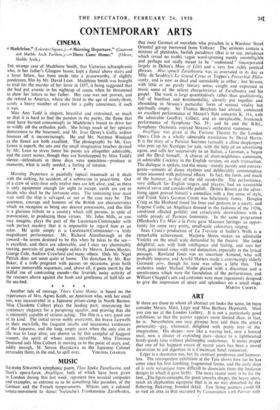MUSIC
RICHARD STRAUSS'S symphonic poem, Thus Spake Zarathustra, and lbert's opera-farce, Angelique, both of which have been given in London during this last week, represent two musical antipodes and examples, so extreme as to be something like parodies, of the German and the French temperaments. Strauss uses a colossal sonata-movement to depict Nietzsche's Frankenstein Zarathustra,
that most German of moralists who preaches in a Wardour Street Oriental get-up borrowed from Voltaire. The sermons contain a mixture of platitudes, foolish paradoxes (that is to say, paradoxes which reveal no truth), vague word-spinning mostly unintelligible and perhaps not really meant to be " undestood " (incorporated largely in Delius's Mass of Life) and a very few richly poetical phrases. Also sprach Zarathustra was as overrated in its day as Mlle. de Scudery's Le Grand Cyrus or Tupper's Proverbial Philo- sophy, and is now as dead and unreadable as either ; but Strauss, with little or no purely literary sense, caught and expressed in music some of the salient characteristics of Zarathustra and his gospel. The work is large quantitatively rather than qualitatively, full of bombast and sentimentality, cleverly put together and abounding in Strauss's particular form of sensual vitality but spiritually empty. Sir Thomas Beecham had already conducted an excellent performance of Mozart's flute concerto K. 314, with the admirable Geoffrey Gilbert, and an inexplicable, breakneck performance of Symphony No. 39; and he and the B.B.C. Symphony Orchestra enjoyed Strauss's orchestral vastnesses
Angelique was given at the Fortune Theatre by the London Opera Club in a wholly admirable translation by David Harris. It is the story of a Parisian Socrates (actually a china-shopkeeper) who puts up his Xantippe for sale, with the help of an advertising agent, and sells her successively to an Italian, a German, a Negro and the Devil himself. A chorus of slum-neighbours comments, in admirable Cockney in the English version, on each transaction. The dialogue is spoken, and the music—mostly parody and extrava- ganza—consists of dance rhythms and deliberately commonplace tunes seasoned with polytonal effects. In fact, the form, and much of the humour, is that of the old vaudeville. The performance, very difficult for English singers and players, had an irresistible natural verve and considerable polish. Dennis Bowen as the adver- tising agent proved himself a comedian with a fine sense of style, and Frank Sale's German Count was hilariously funny. Douglas Craig as the Husband timed his lines and gestures to a nicety, and Eugenie Castle, an Angelique dressed in the fashions of the 1920s, combined affected gentility and cataclysmic shrewishness with a subtle parody of Parisian femininity. In the same programme Offenbach's Un Mari d la Porte gave Maureen Springer an oppor- tunity for some very pretty, small-scale coloratura singing. Joan Cross's production of La Traviata at Sadler's Wells is a remarkable achievement. Marjorie Shires makes an admirable Violetta on the small scale demanded by the theatre. •She looks delightful, acts with both intelligence and feeling, and uses her fresh, pure-toned voice with real distinction, especially in the lyrical passages. Rowland Jones was an uncertain Armand, who will probably improve, and Arnold Matters made a convincingly elderly Germont pere, though his tone was often a little thin. The orchestra under Michael Mudie played with a discretion and a sensitiveness which were the foundation of the performance, and William Chappel's sets and costumes were most ingeniously designed to give the impression of space and splendour on a small stage.
MARTIN COOPER.


































 Previous page
Previous page